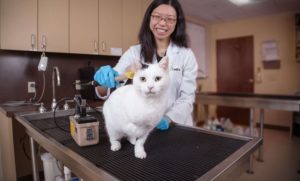Hyperthyroidism is a disease common to middle-aged and older cats caused by thyroid hormone overproduction by the thyroid glands. Hyperthyroidism affects a cat’s metabolism, and causes clinical signs that affect multiple body systems, including:
If your cat has been diagnosed with hyperthyroidism, she will need prompt treatment to normalize her thyroid hormone levels and prevent systemic disease effects. The goal of hyperthyroidism treatment is to reduce thyroid hormone production, which can be accomplished by one of three methods:

Before radioactive iodine is administered, a pre-treatment consultation will be conducted to confirm your cat is a good candidate, and will include diagnostic tests, such as:
If test results indicate your cat can receive radioactive iodine therapy, treatment can typically be started right away.
Radioactive iodine is administered by a single injection under your cat’s skin. The thyroid gland uses iodine for hormone production and readily takes up the radioactive iodine, which destroys hormone-producing thyroid cells and shrinks the gland. At Avets, our board-certified internal medicine specialist will administer your cat’s I-131 treatment and oversee her care.
The dose of I-131 administered to each cat is low, as is the human-exposure risk. To be safe, your cat will be hospitalized in a special ward until her radioactivity reaches an acceptable level, which typically takes two to three days. During her hospitalization, your cat will be cared for by our internal medicine staff, who are trained to limit human radiation exposure. You will not be able to visit her.
When your cat returns home, you will be given specific instructions to prevent excessive exposure and monitor her progress. Cats can have residual radioactivity for up to 12 weeks, during which time the level will steadily decrease. Aftercare typically involves precautions to minimize human exposure, such as:
Any additional medical care that your cat may need during the initial restriction period should be provided by our veterinary staff to avoid potentially exposing radiation to other veterinary professionals, who may not be used to handling cats after I-131 therapy.
Blood tests will be performed to measure your cat’s thyroid hormone levels at one, three, and six months after radioactive iodine treatment. Although we are always available to help with your cat’s aftercare, your family veterinarian can perform the blood testing.
More than 95% of cats treated with radioactive iodine need no additional hyperthyroid treatments. Few cats need a second treatment. Occasionally, the excessive hormone production is caused by a malignant tumor, which must be surgically removed, or treated with higher I-131 doses.
There is a slight risk your cat could become hypothyroid (i.e., develop low thyroid hormone levels) from treatment. In a study of more than 500 cats treated with radioactive iodine, only 2% developed this complication. Cats with hypothyroidism are treated with daily thyroid hormone supplementation.
If your family veterinarian has diagnosed hyperthyroidism in your cat, contact us to learn more about radioactive iodine therapy.